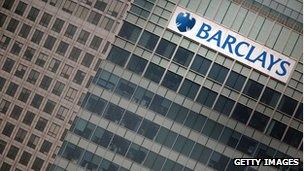Barclays’ chairman in firing line
- Published
- comments

Barclays' share price has dropped drastically following the LIBOR scandal
The news first: an influential shareholder tells me investors may demand the resignation of Marcus Agius as chairman of Barclays.
The main reason, he says, is that the bank may need a cultural overhaul, and investors are not persuaded Mr Agius - who is also a non-executive member of the BBC's executive board - is the right individual to oversee this.
If that seems unfair, in that many would say the chief executive Bob Diamond is more responsible for the mess Barclays finds itself in, this investor would not necessarily disagree. But he feels that Diamond is in many ways an able chief executive, and replacing him will be much harder than finding a new chairman.
The investor has also told Barclays that it needs to appoint someone to conduct an independent review of what went wrong at the bank, focussed in particular on whether the culture of the bank has been sufficiently reformed.
He says Barclays must make a statement in the next 48 hours or so about how it intends to make sure there can never be a repeat of the debacle.
The pressure on Mr Agius and Mr Diamond intensified when Barclays' shares dropped like a stone earlier today: at one point it was 18% lower. "We are very worried that, in a general sense, the wrongdoing that has been identified has imperilled its licence to operate" said the investor.
Paying a price for co-operation
So is there any reason to feel sympathy for Barclays, following the tidal wave of opprobrium that has hit it, after its admission that it tried to rig important interest rates?
That is what I asked a regulator involved in the multi-jurisdictional investigation of banks involved in setting these bank-to-bank rates.
The answer I received was that he understood the public anger.
But he said Barclays could perhaps be seen as having paid a price for having co-operated with the probe - in that it is the first to pay a whopping fine and settle, so it has attracted all the (terrible) publicity.
Other banks, said the regulator somewhat archly, "are not co-operating".
So as and when the regulators reach their verdicts about these uncooperative other banks, would we think Barclays was the worst of the lot?
Probably not.
What Barclays traders did in trying to manipulate the rates was widespread and pervasive in the banking industry. "I don't think Barclays will be seen as an outlier, either much better or much worse than the others", said the regulator.
For what it is worth, we know that Deutsche Bank of Germany, Switzerland's UBS, America's Citigroup, and - from the UK - RBS, Lloyds and HSBC are all being investigated.
If they were all at it - and that is an if - does that mean those calling for Mr Agius or Mr Diamond to go are wrong?
Regulators looked for evidence to pin personal responsibility for the scandal on Mr Diamond, and failed to find it. The official verdict is that the rules were broken by traders working for him, but he didn't know.
That said, at the relevant time, 2005-9, he had huge autonomous control over the business where most of the wrongdoing took place, Barclays Capital.
One of his colleagues described the failure to me as a "colossal failure of culture - bankers, obsessed with generating short-term profits and bonuses, ran amok".
So the reason Mr Diamond is under pressure is that he was the captain on the bridge when that culture was prevalent - and, some argue, he encouraged it.
Mr Diamond would say that in his new role as overall boss of Barclays, he is trying to create a different culture, one where remuneration is not dependent on turning a quick buck.
That said, some would say he is unlucky that at two of the other British banks expected to be punished, Lloyds and RBS, the chief executives - Stephen Hester and Antonio Horta-Osorio - were elsewhere when the alleged wrongdoing took place.
There is an interesting nuance at HSBC. Its chief executive, Stuart Gulliver, ran HSBC investment - like Mr Diamond - when Libor was being manipulated (to be clear, we don't yet know whether HSBC was in on this, though it is being probed).
But here is a resonant fact: the executive chairman of HSBC at the relevant time, Stephen Green, is now Lord Green and works for the prime minister as a minister.
David Cameron was this morning highly critical of Barclays' conduct in the Libor market. If HSBC is tarred with the same brush, will Lord Green's position in the government be sustainable?